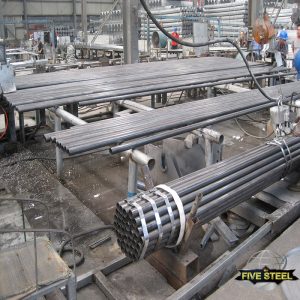How to transform China’s steel industry
China’s steel industry has played a pivotal role in the country’s economic development, driving infrastructure projects and fueling industrial growth. However, as the world shifts towards sustainable practices, it is crucial for China’s steel industry to undergo a transformation that aligns with global environmental standards. By implementing innovative technologies of galvanized steel pipe, promoting resource efficiency, and embracing sustainable practices, China can pave the way for a greener and more competitive steel industry.
Enhancing Energy Efficiency:
One of the key areas for transformation is improving energy efficiency in steel production. China should invest in advanced technologies, such as electric arc furnaces and hydrogen-based steelmaking, which have lower carbon emissions compared to traditional blast furnaces. Upgrading existing infrastructure and enforcing stricter energy efficiency standards of Cold rolled Square Steel Tube will significantly reduce the industry’s carbon footprint.

Promoting Circular Economy:
To minimize waste and optimize resource utilization, China’s steel industry should adopt a circular economy approach. This involves recycling and reusing steel scrap, reducing reliance on raw materials, and implementing efficient waste management systems. Encouraging partnerships between steel mills and recycling facilities can create a closed-loop system that maximizes resource efficiency and minimizes environmental impact.
Developing Low-Carbon Technologies:
Investing in research and development of low-carbon technologies is vital for the transformation of China’s steel industry. This includes exploring carbon capture and storage (CCS) technologies, using renewable energy sources in pre galvanized steel pipe production, and developing innovative methods to reduce carbon emissions throughout the supply chain. Collaborating with international partners and sharing best practices can accelerate the adoption of these technologies.
Strengthening Environmental Regulations:
Stringent environmental regulations and monitoring mechanisms are essential to ensure compliance and accountability in the steel industry. Regular audits, emissions reporting, and penalties for non-compliance should be implemented to encourage responsible practices. Additionally, promoting transparency and information sharing will enable stakeholders to make informed decisions and hold polluters accountable.
Encouraging Industry Collaboration:
Government, industry players, and research institutions need to collaborate closely to drive innovation and foster sustainable practices in the rectangular hollow section. By establishing platforms for knowledge sharing, joint research and development projects, and financial incentives for sustainable initiatives, China can create an ecosystem that supports the transformation of the steel industry.
Transforming China’s steel industry is a complex but crucial task for achieving sustainable development. By prioritizing energy efficiency, embracing circular economy principles, investing in low-carbon technologies, enforcing environmental regulations, and promoting collaboration, China can lead the way in building a greener and more competitive steel industry. This transformation will not only benefit the environment but also position China as a global leader in sustainable steel production, ensuring long-term economic growth and a healthier future for all.
Tel: +86 18202256900 Email: steel@tjdpbd.com









